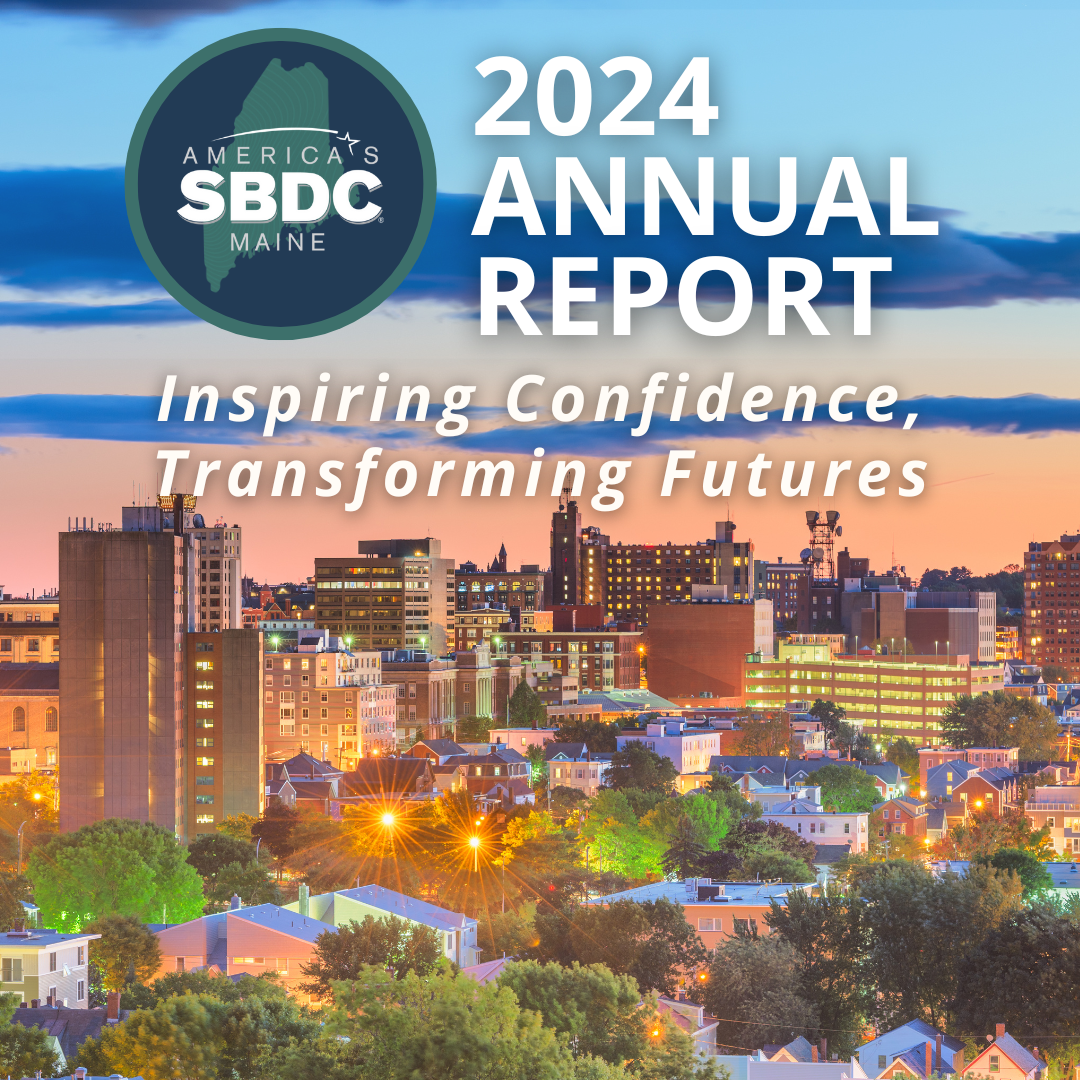 For many years, Veronica Page, a Maine native, worked as a dog groomer for others, but she wanted the opportunity to provide better service on her own terms. She dreamed of opening a place of her own but didn’t know where to start.
For many years, Veronica Page, a Maine native, worked as a dog groomer for others, but she wanted the opportunity to provide better service on her own terms. She dreamed of opening a place of her own but didn’t know where to start.
Blog
Motivating and Managing a Small Team: Strategies for Small Business Success
 Team motivation is not just a workplace perk. It plays a critical role in productivity, customer service, employee retention, and innovation. In a recent Maine SBDC webinar, Business Advisor Christina Dodge focused on how small business owners can build a motivated and accountable team with limited time and resources.
Team motivation is not just a workplace perk. It plays a critical role in productivity, customer service, employee retention, and innovation. In a recent Maine SBDC webinar, Business Advisor Christina Dodge focused on how small business owners can build a motivated and accountable team with limited time and resources.
In this blog, you will find strategies shared during the session to help you motivate your team and build a healthier workplace culture.
Know Your Team and What Drives Them
Understanding your team starts with recognizing their personalities, workstyles, and strengths. Some are driven by external rewards, others by purpose, learning, or independence. Knowing the difference between extrinsic and intrinsic motivation helps business owners tailor their approach.
For small teams, this can be easier to manage, and the payoff is often substantial. Personalized motivation leads to stronger engagement and better performance.
Communication, Trust, and Empowerment
Effective communication is essential. Regular check-ins should be part of your routine, whether your staff is in person or remote. They do not need to be long, but they should be consistent and encourage real dialogue. Using tools like Teams or Slack can support more frequent collaboration.
Trust grows from consistency and transparency. Employees need to understand your goals and the challenges the business is facing. Being honest, treating people fairly, and sharing both successes and setbacks helps build trust. It also gives employees a clear sense of where they fit into the bigger picture.
Empowering employees means giving them ownership over their work and encouraging problem solving. Micromanagement can damage trust. When employees feel trusted, they are more likely to step up and succeed.
Recognize, Celebrate, and Build a Positive Culture
Recognition is a powerful motivator. Whether public or private, what matters is that it feels meaningful to the employee. A handwritten thank-you note, a shoutout at a staff meeting, or a feature on social media can go a long way.
A positive team culture encourages collaboration over competition. Team building, brainstorming, and casual check-ins help people connect, even when schedules differ. Icebreakers that prompt staff to share stories or interests help strengthen relationships.
Providing growth opportunities is another important part of motivation. Training, certifications, and even small steps toward career advancement let employees know you are invested in their future, not just the task at hand.
Address Issues Early and Lead with Empathy
Feedback should be timely, specific, and actionable. Delaying feedback can allow issues to grow. Constructive feedback should be balanced with recognition of what the employee is doing well. When issues are discussed with fairness and clarity, employees are more likely to improve and stay engaged.
Conflict is often one of the hardest areas for small business owners. Time is limited, and staffing challenges may make it tempting to let small issues slide. But unresolved conflict can create tension across the team. A respectful, open environment for feedback gives everyone a voice and helps prevent bigger problems.
Empathy also plays an important role. Being approachable and listening actively shows that you value your team. Personal concerns may arise that affect someone’s workday. For example, if an employee is dealing with the loss of a pet or family member, offering flexibility with scheduling or giving them space to regroup can show genuine support. Healthy boundaries matter, but support during tough times can leave a lasting impact.
Final Thoughts
Your team looks to you for cues on how to behave and what matters. If you demonstrate accountability, consistency, and a strong work ethic, your employees are more likely to follow that example. Motivation and management are essential to building a strong team.
To watch the full webinar, visit our YouTube channel. If you are interested in applying these strategies in your own business, the Maine SBDC offers no-cost advising to help you take the next step. Learn more at www.mainesbdc.org.
Kevin Browne Architecture – Falmouth
Kevin Browne is the founder of Kevin Browne Architecture (KBA), a residential architecture firm based in Falmouth. They focus on thoughtful and lasting designs that cater to their clients’ unique needs.
News Release: Maine SBDC Releases 2024 Results
February 19, 2025
Maine SBDC Releases 2024 Results: Supporting and empowering entrepreneurs throughout Maine
 Portland, Maine – The Maine Small Business Development Centers (SBDC) is proud to announce the release of its 2024 Annual Report. The report, available here, highlights the Maine SBDC’s impact in supporting Maine’s entrepreneurs and small businesses. The report showcases the tangible outcomes in 2024 and spotlights individual success stories that underscore the powerful effect of the program’s business advising and training services.
Portland, Maine – The Maine Small Business Development Centers (SBDC) is proud to announce the release of its 2024 Annual Report. The report, available here, highlights the Maine SBDC’s impact in supporting Maine’s entrepreneurs and small businesses. The report showcases the tangible outcomes in 2024 and spotlights individual success stories that underscore the powerful effect of the program’s business advising and training services.
In 2024, business advisors across Maine provided no-cost, confidential business advising to 2,227 entrepreneurs and small businesses. They spent nearly 8,800 hours assisting clients which helped to:
- Start 132 new businesses
- Save and create 526 jobs
- Access $34 million in funding
“Maine’s small businesses continue to demonstrate resilience, determination, and a drive for success. Our 2024 Annual Report reflects their achievements and the critical role the Maine SBDC plays in providing expert guidance to help them navigate challenges, capitalize on opportunities, and build stronger businesses. We are proud to support Maine’s entrepreneurs in their journey toward long-term growth and stability,” commented Maine SBDC State Director Mark Delisle.
To access the full 2024 Digital Annual Report, visit:
www.mainesbdc.org/annual-report/2024/
About the Maine Small Business Development Centers (Maine SBDC):
The Maine SBDC helps build and strengthen small businesses through no-cost, confidential business advising, training, and educational resources. It is part of a national network of nearly 1,000 centers. The program is funded through a cooperative agreement with the U.S. Small Business Administration, the Maine Department of Economic and Community Development, and the University of Southern Maine. For more information about Maine SBDC, visit www.mainesbdc.org or call 207-780-4420.
China Lake Provisions – China
 Mike Brown envisioned creating a welcoming space where the community could find high-quality, locally sourced food. That vision became China Lake Provisions, a deli, pizza, and sub shop offering a variety of healthy foods and local goods.
Mike Brown envisioned creating a welcoming space where the community could find high-quality, locally sourced food. That vision became China Lake Provisions, a deli, pizza, and sub shop offering a variety of healthy foods and local goods.
When Mike and his team first set out to open their business, they faced a major hurdle: securing financing. Unsure where to start, they turned to the Maine SBDC after a recommendation from their local chamber of commerce.
Mandy’s Paw-sitive Strides – Patten
 Mandy’s Paw-sitive Strides is a dog-walking business owned and operated by Mandy Lyman, a dedicated animal lover in Patton, Maine. Mandy provides 30-minute walks for dogs, ensuring they receive exercise and care while their owners are busy. Fully licensed and insured, Mandy has also participated in dog obedience classes to deliver top-notch service.
Mandy’s Paw-sitive Strides is a dog-walking business owned and operated by Mandy Lyman, a dedicated animal lover in Patton, Maine. Mandy provides 30-minute walks for dogs, ensuring they receive exercise and care while their owners are busy. Fully licensed and insured, Mandy has also participated in dog obedience classes to deliver top-notch service.
Mandy came to the Maine SBDC in April 2023 with a dream of starting her own dog-walking business. Mandy wanted to contribute to her community and earn her own income. Her initial goal was to attract 3 to 4 regular clients and work 4 to 6 hours weekly, but she needed guidance and resources to make it a reality.
Navigating 2025: Compliance Updates for Small Businesses
As we begin 2025, staying informed about compliance updates for small businesses is more important than ever. These regulatory changes can significantly impact your operations, and understanding them is key to staying compliant and prepared.
During a recent Maine SBDC webinar, Certified Business Advisors Peter Harriman, Ali Lane, and Dan Umphrey shared insights about key federal and state mandates, including the Corporate Transparency Act (CTA), minimum wage increases, the Paid Family Leave law, changes to reporting thresholds, the Pregnant Workers Fairness Act, and new I-9 form requirements. This blog provides a concise guide to help you navigate these updates.
Corporate Transparency Act and BOI Reports
The Corporate Transparency Act (CTA) introduces new reporting requirements aimed at preventing fraud and enhancing corporate transparency. However, the deadline to file Beneficial Owner Information (BOI) reports is currently on hold. A recent court ruling has paused the January 13, 2025, deadline, and further updates are expected as legal proceedings continue.
What Does This Mean for Your Business?
- The January 13, 2025, deadline is currently suspended. Businesses should stay informed as the situation evolves.
- While the deadline is uncertain, it’s still advisable to prepare your BOI reports in advance to avoid last-minute challenges when a new compliance date is announced.
What to Know:
- BOI reports require identifying the individuals who own or control an LLC or corporation.
- Filing is free via the Financial Crimes Enforcement Network (FinCEN website).
- You are not required to use a third-party service that charges fees for filing.
- Keep an eye on official updates from FinCEN and legal developments.
Minimum Wage Updates
Minimum wage rates are increasing in 2025:
- Statewide: $14.65/hour, tipped wage at $7.33/hour.
- Portland and Rockland: $15.50/hour, tipped wage at $7.75/hour.
For salaried, exempt employees, the minimum weekly pay increases to $843.51. However, potential federal legislation could push this threshold significantly higher, pending court decisions. Employers should monitor updates and budget accordingly.
Paid Family Leave Law
Starting January 2026, Maine’s Paid Family and Medical Leave (PFML) law will provide eligible workers up to 12 weeks of paid leave for family or medical reasons. Contributions to the program began on January 1, 2025, and the online PFML Employer Portal launched on January 6, 2025.
Employers Must:
- Register on Maine’s Department of Labor portal to file quarterly wage reports, designate payroll processors, and remit contributions.
- Notify employees about the program and their rights to take leave.
Contribution Details for Businesses:
- Fewer than 15 employees: 0.5% of payroll, which can be fully passed to employees.
- 15 or more employees: 1% of payroll, shared between employer and employee.
Employers must submit their first quarterly wage reports and premium payments between April 1 and April 30, 2025. The portal also supports self-employed individuals and tribal governments choosing to participate.
Changes to Reporting Requirements
Adapting to updated reporting requirements is essential for maintaining compliance and ensuring smooth business operations. These changes aim to enhance transparency and accountability, affecting thresholds for 1099-K forms and state tax reporting.
- 1099 Reporting Threshold: The threshold for receiving 1099-K forms is gradually lowering. For 2024, the threshold is $5,000. For 2025, the threshold will be $2,500. By 2026, it will drop to $600, increasing IRS scrutiny on online sales.
- Maine Tax Reporting: Businesses must now report to the state if they issue 10 or more combined 1099s and W-2s, down from the previous threshold of 200. Reports are completed using the Maine Tax Portal.
Pregnant Workers Fairness Act
The Pregnant Workers Fairness Act (PWFA) requires businesses with 15 or more employees to provide reasonable accommodations for pregnancy-related conditions unless it causes undue hardship. Reasonable accommodations may include modified schedules, seating, or remote work options. Maintaining clear communication and documentation with employees is crucial.
New I-9 Form Requirements
Employers must now use the updated I-9 form, which expires on May 31, 2027, for verifying employment eligibility. The I-9 form must be completed within three days of hire and retained for three years or one year after termination, whichever is later. A new I-9 form must also be completed for any workers whose work authorization has expired.
Next Steps for Small Business Owners
Adapting to these mandates may seem complex, but with proactive planning and reliable resources, your business can adapt and thrive. These steps will help your small business navigate the 2025 compliance updates with confidence. For a quick reference, here’s your 2025 compliance checklist:
- Understand Your Responsibilities: Review the mandates that apply to your business, including size-specific thresholds.
- Stay Informed: Visit the Maine Department of Labor website for updates, instructional resources, and registration requirements.
- Communicate with Employees: Ensure employees are informed about new policies, such as paid family leave, and their responsibilities under these laws.
- Consult Experts: Reach out to Maine SBDC advisors for guidance tailored to your business. Their no-cost, confidential advising services can help you navigate these changes.
SimKit – Scarborough
 It’s a well-known truth that the most successful businesses solve real-world problems. That is exactly what Dr. Jason Hine, Emergency Medicine Physician in Maine set out to do by forming his company, SimKit.
It’s a well-known truth that the most successful businesses solve real-world problems. That is exactly what Dr. Jason Hine, Emergency Medicine Physician in Maine set out to do by forming his company, SimKit.
Unlike specialists, emergency physicians must be prepared to perform a wide range of procedures, often at a moment’s notice and under pressure. Some of these procedures are complex and rarely performed, which can lead to “skill decay.”
Fore & Wharf – Portland
 Dylan John and his fiancé Ellen turned their passion for style and community into Fore & Wharf, a boutique located in the heart of Portland. Specializing in thoughtfully curated men’s and women’s clothing, the shop embodies the charm and lifestyle of New England. Dylan’s vision was to create a store that celebrates coastal living while offering high-quality, unique pieces to be enjoyed by all.
Dylan John and his fiancé Ellen turned their passion for style and community into Fore & Wharf, a boutique located in the heart of Portland. Specializing in thoughtfully curated men’s and women’s clothing, the shop embodies the charm and lifestyle of New England. Dylan’s vision was to create a store that celebrates coastal living while offering high-quality, unique pieces to be enjoyed by all.
Stand Out This Holiday Season: A Small Business Guide to Success
As the holiday season approaches, consumer spending is expected to rise. Even more promising, nearly 50% of shoppers prefer to visit physical stores to “assess products first-hand,” according to a recent Accenture Holiday Shopping survey. In this guide, we share three strategies to help your small business make the most of this shopping season.
Tip 1: Participate in Small Business Saturday
Small Business Saturday is happening on November 30, 2024! This special day highlights the importance of supporting small, local businesses. With proper planning, you can make it a standout day for your business. Here’s how to prepare:
